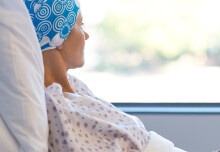

Project aims to identify a defective point on the insulin signalling pathway in women with PCOS <em> - News release </em>
See also...
Division of Surgery, Oncology, Reproductive Biology and Anaesthetics
External sites:
(Imperial College is not responsible for the content of these external internet sites)
Imperial College London News Release
For immediate release
Monday 12 March 2007
Understanding the link between Polycystic Ovary Syndrome (PCOS) and insulin resistance is the aim of a new project announced today, funded by the charity WellBeing of Women.
It is known that women with PCOS have a 3-fold increase in their risk of developing type-2 diabetes, where the body does not produce enough insulin or cannot use insulin properly. Insulin resistance is an important factor in the condition, which is the most common female hormone disorder. PCOS affects between 5 and 10 per cent of women and is a major cause of infertility.
The new GBP 97K project aims to identify a defective point on the insulin signalling pathway in women with PCOS. The researchers, from Imperial College London, hope this will enable the development of new therapies which target this part of the pathway, to counter the insulin resistance and the fertility problems that PCOS can cause.
Insulin is released from cells in the pancreas after eating and it signals insulin-sensitive tissues (such as fat and muscle) to take up glucose, keeping glucose levels in the bloodstream normal. In people with insulin resistance, normal amounts of insulin are not adequate to produce a normal glucose response, meaning that levels of insulin in the bloodstream need to be higher to achieve normal blood sugar levels.
Insulin resistance (and/or the compensatory excess of insulin in the bloodstream), may contribute to abnormalities in function of the ovaries that lead to many of the symptoms of PCOS. These include irregular periods, or no periods at all; fertility problems; weight gain; acne; and excessive hair growth (hirsutism).
A longer term concern is that insulin resistance also predisposes people to diabetes. In some patients the pancreas is unable, in the long-term, to produce enough insulin to compensate for the resistance of the tissues to insulin action. Consequently, blood sugar levels rise. What is not known is why PCOS and insulin resistance are so closely related.
The researchers hope that the new project will explain the link between PCOS and insulin resistance and how the link manifests itself at the level of individual cells.
The researchers will be looking at how ovarian cells metabolise glucose in women both with and without PCOS.
Professor Stephen Franks said: "PCOS gives rise to a range of symptoms. These may be very distressing not only because of problems with irregular periods and with fertility but also because of excess body hair, acne or alopecia. We still do not fully understand the underlying cause or causes of PCOS but insulin resistance plays an important part in many patients.
"These studies will give us the chance to look directly at the mechanism of insulin resistance at the level of an important target tissue – the ovary. We expect the results of these studies to give us information that will help to devise new and more effective methods of treatment for this very common hormone problem," he added.
-ends-
For further information please contact:
Laura Gallagher
Press Officer
Imperial College London
e-mail: l.gallagher@imperial.ac.uk
Telephone: +44 (0)207 594 6702 or ext. 46702
Out of hours duty Press Officer: +44 (0)7803 886 248
Lynsey Goodmaker
PR & Communications Manager
WellBeing of Women
e-mail: lgoodmaker.wellbeingofwomen@rcog.org.uk
Tel: +44 (0)20 7772 6317
Notes to editors:
1. About Imperial College London
Rated as the world's ninth best university in the 2006 Times Higher Education Supplement University Rankings, Imperial College London is a science-based institution with a reputation for excellence in teaching and research that attracts 11,500 students and 6,000 staff of the highest international quality.
Innovative research at the College explores the interface between science, medicine, engineering and management and delivers practical solutions that improve quality of life and the environment - underpinned by a dynamic enterprise culture.
With 62 Fellows of the Royal Society among our current academic staff and distinguished past members of the College including 14 Nobel Laureates and two Fields Medallists, Imperial's contribution to society has been immense. Inventions and innovations include the discovery of penicillin, the development of holography and the foundations of fibre optics. This commitment to the application of our research for the benefit of all continues today with current focuses including interdisciplinary collaborations to tackle climate change and mathematical modelling to predict and control the spread of infectious diseases.
The College's 100 years of living science will be celebrated throughout 2007 with a range of events to mark the Centenary of the signing of Imperial's founding charter on 8 July 1907. Website: www.imperial.ac.uk
2. About WellBeing of Women
a. WellBeing of Women is the UK charity dedicated to solving health problems that only affect women.
b. WellBeing of Women invests in medical research and training to find real solutions to these problems. Since the charity was founded over forty years ago, in excess of GBP 25m has been donated to fund the very best research. It is true to say that every woman born since 1964 will have benefited from the advances in health made possible by WoW funded projects.
c. Every day in hospitals and laboratories all over Britain, WellBeing of Women funded doctors and their researchers are working hard to find the answers which will save the lives of women and their babies.
d. WellBeing of Women works in partnership with the Royal College of Obstetricians and Gynaecologists to improve women's health.
Article text (excluding photos or graphics) available under an Attribution-NonCommercial-ShareAlike Creative Commons license.
Photos and graphics subject to third party copyright used with permission or © Imperial College London.





